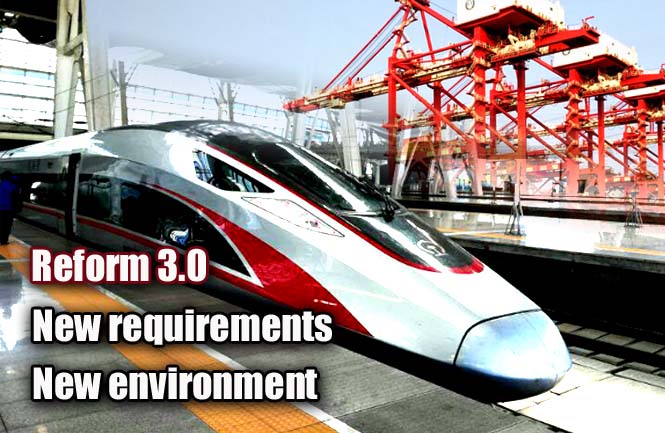New Requirements and New Environment for the Third Phase of Reform
2018-11-23

By Zhang Junwei, DRC
2018-10-8
In terms of improving the socialist market economic system, the third phase of reform (known as 3.0 for short) needs to meet the following three requirements. First, we need to establish a market economy in the true sense and let the market play the decisive role in resource allocation. Second, we need to establish a sound market economy with adequate legal system, transparent rules, orderly competition and high efficiency, that can effectively guide the optimal allocation of resources and constantly improve the economic efficiency. Third, we need to effectively give play to the role of the government and better leverage the synergy between the government and the market.
I. New requirements for the third phase of reform
During the third phase of reform, we need to focus on the realization of the Chinese Dream in terms of national modernization and national rejuvenation. The direct goal is to establish the institutional mechanism and interest orientation that embodies the inherent requirements of “new development concept”. We need to put into practice the philosophy of innovative, coordinated, green, open and shared development. This philosophy is put forward by the CPC Central Committee based on an in-depth analysis of domestic and international development trends, and a comprehensive summary of China’s development experience and lessons over the past few years. Among them, innovative development focuses on increasing development forces, coordinated development on addressing the unbalanced issues, green development on ensuring harmony between human and the nature, open development on taking into consideration both external and internal issues, and shared development on solving the problem of social equity and justice. Viewing from the three perspectives of innovation, common sharing and opening-up, we can see clearly the new requirements facing the third phase of reform. First, as regards innovation development, it is an inevitable choice after China’s demographic dividends become phased out and economic development enters the later stage of industrialization. To promote innovative development, we must unwaveringly adhere to the decisive role of market mechanism in resource allocation. And the market mechanism mentioned here is a legal-based, normative, transparent and effective mechanism. To this end, the government must provide corresponding and high-quality public products such as a complete legal system, strict law enforcement and a stable macroeconomic environment. Furthermore, due to the transformation in the course of industrialization, the leading industries are now replaced rapidly in China and the industrial structure is swiftly adjusted. Accordingly, the government’s industrial policies also need to be upgraded to accelerate the economic transformation and upgrading. Second, with regard to the shared development, we need to strengthen income adjustment, increase the supply of basic public services and flesh out the social security system, which could not only tap the potential of domestic demand and realize sustainable development, but also meet the inherent requirement to promote the sharing of development results and realize social equity and justice. Third, with respect to open development, to achieve the leap forward“from big to strong”, China’s economy must make full use of domestic and foreign markets and resources through greater openness.
II. External environment for the third phase of reform
Compared with the second phase of reform, the external environment facing the third phase of reform has changed dramatically, mainly in the following aspects. First, more emphasis is laid on socialism-oriented reform. Second, restructuring and management enforcement interweave each other, resulting in cultural conflicts. Third, emergency management and normal construction are interwoven, testing the reform’s “time consistency”. Fourth, the public has high enthusiasm for the reform, posing challenges to the traditional decision-making and proceeding mechanism. Fifth, as the international political and economic environment tends to become complex, the international experience would have less effects on reform.
III. Some misconceptions about the third phase of reform
First, there is a generalized concept on reform. During the third phase of reform, China’s economic and social environment is experiencing significant changes. As a result, the government is required to make efforts in promoting reform, strengthening management, responding emergency issues properly and maintaining stability, but in the context of emphasizing reform, it is easy to take the latter two types of government behavior as reform measures. Second, reform is inclined to become superficial. The long-term reform and favorable environment has greatly strengthened people’s confidence in reform. Some people may take it for granted that success can be achieved as long as they work firmly towards the reform goal, and they would easily ignore the design of the reform process, whereas some hard nuts remain to be cracked in the formulation of detailed reform measures. Third, some people would reject mature international experience and close the door to carry out reform. Currently, conflicts among major powers have notably increased. In dealing with these conflicts such as Sino-US trade frictions, China is bound to gain a bigger say in global affairs and demonstrate the advantages of China’s development model and China’s growth road. This could easily lead to the tendency to reject international experience and pursue reform behind a closed door. If the reform concept is generalized, the reform becomes superficial or reform is advanced without opening-up, the reform targets would in no way be fulfilled. Making empty promise will seriously damage the moral strength of reform, weaken public’s trust in the government, drain the impetus of reform and pose the risk of giving up reform halfway.














